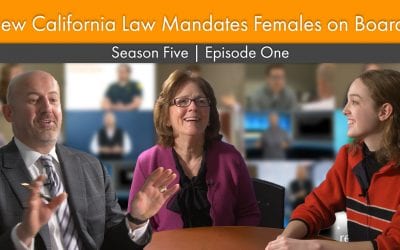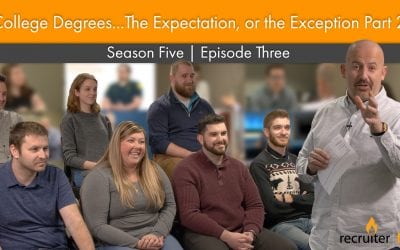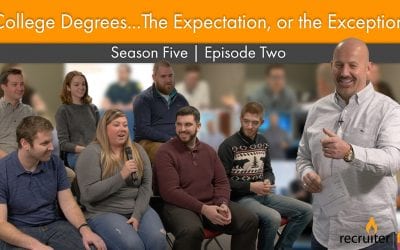
Season 4, Episode 4:
Understanding Veterans as Candidates
This week on Recruiter Fuel, Steve sat down with Sales Consultant, Ian Davidson. This interview was a little different than the typical Recruiter Fuel episodes though. The premise of Recruiter Fuel is to talk to those in the industry about the industry. We switched things up this week to talk to Ian about the obstacles veterans face with finding a job after the military.
It’s common to hear that veterans can’t find the right job when they get out of the service, but Steve said he is also constantly hearing from employers that they can’t find enough veterans. There seems to be an ongoing disconnect between both sides.
A little background on Ian – Ian was in the United States Army for four years. In those four years, he was deployed and experienced many things that the average person could not imagine. As Ian started to transition out of the army, it became apparent that there was going to be some difficulties with finding a job.
When did the discussion of finding a job after the army happen?
Ian said the discussion happened when he was about a year out. He was approached with the option of re-enlisting, but once he decided against that, he was faced with a big question, “what am I going to do?” The transition back into everyday life became nerve-wracking.
Why are the recruiters saying they can’t find enough veterans to fill positions, but veterans are worried that they can’t find a job?
Ian explained that veterans feel that they have a disadvantage by not having a degree. When you’re first coming out of the military, you don’t immediately see how the skills obtained in service apply to the skills that hiring managers are looking for. For Ian, and I’m sure many other veterans, he was worried he would get out and not have a job, so he took the first offer that came his way.
What did you learn from taking the first job that was offered? How can you relate what you learned to employers or other veterans that will be getting out soon?
Ian noticed that he worked harder than most. He put in extra hours when it wasn’t needed. He always wanted to find growth in his work. In the military, your efforts moved you up in ranking. Once you’re out of the military, you look to do the same thing. “You never want to stay stagnant”, said Ian.
How do we bridge the gap between employers and veterans?
Ian thinks the demand for veterans needs to be laid out more clearly by employers. Be more specific in what type of skillset you’re looking for in veterans. Do you want someone who has been deployed? Do you want someone with combat experience? Do you want someone who had a combat job, or do you want someone that supported those who had a combat job?
What are the qualities that transfer from being in combat?
Someone in combat will have strong teamwork experience and the ability to read others, along with many other transferrable traits.
How can employers get more involved, sooner, in the life of a veteran or soon to be veteran?
Unfortunately, there isn’t a laid-out plan for how employers can get involved sooner. The military does have a program called ACAP (Army Career and Alumni Program), that provides guidance and assistance with the transition of leaving the military. A lot of what is discussed (housing, income, jobs) becomes overwhelming for those in the service to the point where some decide last minute that they don’t want to leave the military because they’re comfortable with their routine.
From a recruiter’s perspective, someone that has never been in the military, do you have any advice you can give to a recruiter now that you’ve been in the industry for a while?
Without hesitation, Ian responds, “Look at their resume and actually read it.” In the military, we’re taught to keep resumes brief so that they can go into further explanation once they’re in an interview. If you see on a veteran’s resume that they have leadership skills, call them, and ask them what that means. Everybody can say they have leadership skills, but take the time to ask, “what did you do to be a leader?” Ian’s other advice is to be patient. Veteran’s are making a huge transition. If they’re putting in the effort and they’re putting in the hours, give them some extra time to catch on to things because it might not come as quickly in the beginning. Their value is in their work ethic and if you give them time, it should pay off.
Steve concluded the discussion by pointing out to anyone that is in recruiting who is focused on finding veterans, take some of what Ian said to heart because he is living, breathing proof of all the hurdles that veterans face. Ian has come a long way and has been able to take his experience from the military and learn a new industry.
Thank you, Ian, for your time AND for your service!
About Recruiter Fuel
Recruiter Fuel is a weekly video series dedicated to all-things recruiting and talent acquisition. Learn More our mission and how you can submit a topic, be featured in an episode, or nominate an expert to guest star on an upcoming episode.
Visit the Recruiter Fuel series directory for more content.





